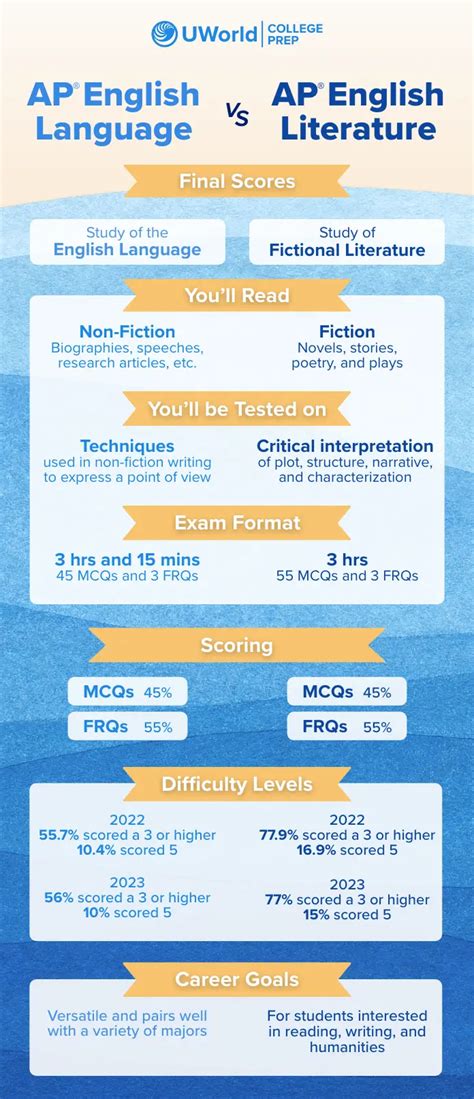As a high school student, you will likely encounter two English courses that differ significantly in their rigor and expectations: English 101 and AP English. This comprehensive guide will outline the key differences between these courses, providing you with a clear understanding of their purpose, curriculum, assessment, and potential benefits. By exploring this detailed comparison, you will gain valuable insights to make informed decisions about your English coursework and ultimately achieve your academic goals.

Table: Key Differences Between English 101 and AP English
| Characteristic | English 101 | AP English |
|---|---|---|
| Grade Level | 9-10 | 11-12 |
| Prerequisite | None | English 101 or equivalent |
| Course Length | One semester or one year | One year |
| Curriculum | Core English skills and literature | College-level English skills and literature |
| Assessment | Traditional grading (e.g., essays, quizzes, exams) | AP Exam (a standardized national exam) |
| College Credit | Not typically offered | May earn college credit if AP Exam score is high enough |
English 101: The Foundation of English Education
Purpose: English 101 is a foundational course designed to enhance students’ essential English skills, including reading, writing, grammar, and vocabulary. This course serves as a preparatory step for more advanced English coursework and beyond.
Curriculum: The English 101 curriculum typically covers a range of topics, including:
- Grammar and Mechanics: Sentence structure, punctuation, and usage
- Composition: Essay writing, including structure, development, and style
- Reading Comprehension: Analyzing and interpreting various literary texts
- Vocabulary Expansion: Expanding students’ word knowledge and usage
Assessment: Students in English 101 are assessed through a combination of traditional grading methods, such as essays, quizzes, and exams. These assessments measure students’ understanding of course content and their ability to apply their skills in written and oral communication.
AP English: College-Level Rigor and Preparation
Purpose: AP English is a rigorous and challenging course designed to prepare students for the rigors of college-level English studies. This course emphasizes critical thinking, analysis, and writing skills while exploring complex literary works.
Curriculum: The AP English curriculum is typically divided into two main components:
- Literature and Composition: Reading and analyzing a wide range of literary texts, including novels, plays, and poems
- Rhetoric and Argumentation: Developing and presenting persuasive arguments through written and oral communication
Assessment: The primary assessment in AP English is the AP Exam, a standardized national exam that measures students’ understanding of the course content and their ability to write effectively about literary texts. Students who score well on the AP Exam may be eligible for college credit or advanced placement in college English courses.
Table: Advantages and Disadvantages of English 101 and AP English
| Characteristic | English 101 | AP English |
|---|---|---|
| Advantages | * Provides a foundational base for English skills * Prepares students for English 102 and beyond * No AP Exam required | * College-level preparation * Potential for college credit * Rigorous and challenging curriculum |
| Disadvantages | * Not as rigorous as AP English * May not be appropriate for all students * Less preparation for college English | * Challenging and demanding course * Requires significant time and effort * Not all students are eligible |
How to Choose the Right Course for You
The decision between English 101 and AP English depends on several factors, including your academic goals, interests, and abilities:
- If you are seeking a strong foundation in English skills and preparing for future English coursework, English 101 is a suitable choice.
- If you are highly motivated, excel in English, and aspire to college-level English studies, AP English offers rigorous preparation.
Tips for Success in English 101 and AP English
Regardless of which course you choose, there are some general tips that can help you succeed:
- Attend class regularly: Regular attendance ensures that you do not miss important material and allows you to participate in class discussions.
- Complete assignments thoroughly: Assignments provide opportunities to practice and apply your skills. Dedicate time to completing them carefully.
- Seek help when needed: Do not hesitate to reach out to your teacher or a tutor if you need additional support.
- Read widely: Reading outside of class assignments expands your vocabulary and knowledge while improving your comprehension skills.
- Practice writing: Writing regularly helps you develop your style, organization, and mechanics.
Conclusion
English 101 and AP English are distinct courses that cater to different student needs and aspirations. By understanding the key differences between these courses, you can make an informed decision about which one is right for you. Whether you choose English 101 to lay a solid foundation or AP English to challenge yourself and prepare for college-level studies, dedication and effort will lead to success in your English education.
